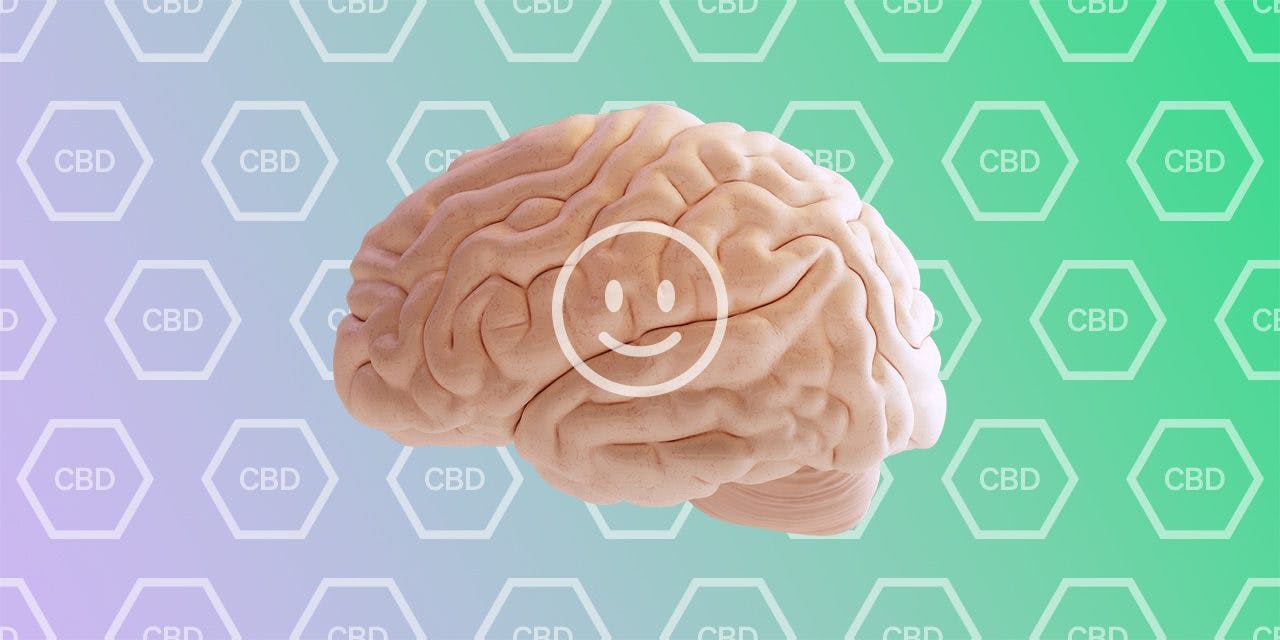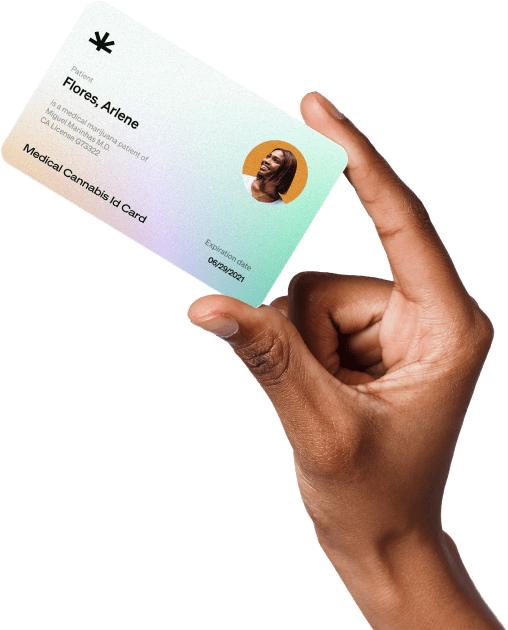Does CBD Increase Dopamine Levels?

Article written by

Dipak HemrajHead of Research and Education
Content reviewed by

Dr. Lewis JasseyMedical Director - Pediatric Medicine
Cannabidiol, usually in the form of CBD oil, can increase your body’s dopamine levels by interacting with the cannabinoid receptors of your endocannabinoid system. When this interaction occurs, dopamine receptors in your brain and body are triggered to release more dopamine, increasing dopamine production.
Get your medical marijuana card
Connect with a licensed physician online in minutes.
What Is Dopamine?
Dopamine is a neurotransmitter that your body releases in response to physical and mental stimuli. It is responsible for much of your ability to feel pleasure, happiness, and satisfaction — which is why it is commonly known as the “pleasure chemical” — and is used by your body to “reward” you for performing positive actions.
Some activities that trigger dopamine release include hugging a loved one, smelling freshly baked cookies, having a good workout, and solving a puzzle.
But dopamine does more than just produce sensations of pleasure and satisfaction. It is needed for your body to work correctly and is involved in the regulation of many bodily functions, including:
- Memory and focus
- Sleep
- Reward-seeking behavior
- Emotions and mood
- Stress response
- Processing pain
- Learning, productivity, and planning
- Motivation
It is primarily produced in the brain, specifically in the ventral tegmental area and the substantia nigra. Multiple reports indicate that various cannabinoids, including CBD, increase the firing rate of ventral tegmental area dopamine neurons.
Increased firing of dopamine neurons can result in increases in dopamine levels. In addition, dopamine concentrations may increase as new dopamine is created faster than degraded.
When your dopamine levels become dysregulated and drop below what they should be, you may notice changes in how you feel and act. Without enough dopamine, your body may struggle to operate as it usually would.
Download Free Guide to the ECS
How Does It Feel When My Dopamine Is Low?
Your body uses dopamine as a reward to make you feel good when performing tasks your body sees as positive, like solving a puzzle or eating good food. When your dopamine levels get too low, these tasks may seem less appealing because you don’t experience satisfaction afterward.
Low dopamine levels often make you feel less motivated, reducing your interest in activities and taking the “spark” out of life. They have also been linked to mental health conditions like depression.
The symptoms you experience because of low dopamine vary depending on how low your dopamine actually is and what is causing the imbalance. Dopamine imbalances can be caused by medical or mental health conditions or drug abuse.
While individual symptoms may vary depending on the cause of lowered dopamine levels, some of the common symptoms of low dopamine include:
- Muscle cramps, spasms, or stiffness
- Gastrointestinal problems like acid reflux, indigestion, and gut upset
- Feeling tired, unmotivated, or without hope for the future
- Low sex-drive
- Sleep disturbances like difficulty falling or staying asleep
Low dopamine levels are a concern as they may indicate a more serious underlying condition. You should speak to a doctor if you believe you may have low dopamine levels. They can provide expert advice and present you with personalized treatment options.
Why Might My Dopamine Levels Be Low?
There are multiple possible causes of low dopamine, each with its own dopamine-lowering mechanism. The seriousness of low dopamine also varies based on how it has been lowered.
Parkinson’s Disease
Some diseases can affect your dopamine levels. Parkinson’s Disease is a degenerative disease that affects the nerve cells in your body that produce dopamine, called dopaminergic nerve cells. As these cells die, your body’s ability to make dopamine drops, triggering a decrease in dopamine levels.
Mental Illness
Many mental illnesses are associated with low dopamine levels, like depression, schizophrenia, and psychosis. It is unclear whether the low dopamine is a cause or a result of these mental illnesses, though it is known that dopamine is only part of the equation.
Recreational Drugs
The pleasure one gets from taking recreational drugs is primarily caused by dopamine release. Typically, when dopamine is released, it triggers a nerve to respond and is then recycled back to the original nerve by dopamine transporters.
Recreational drugs like cocaine block these dopamine transporters. This means that any dopamine released into the space between two nerve receptors stays there, triggering a dopamine response over and over. This gives the user a euphoric feeling. The overuse of dopamine through recreational drugs can result in a crash after the drug leaves the system, with dopamine levels dropping far below what they should be.
Does CBD Affect Dopamine Receptors?
Yes, cannabidiol can affect your dopamine receptors through a few different mechanisms and likely more that we don’t yet know about.
Unlike the more well-known cannabinoid THC, CBD is not intoxicating, and more notably, it does not activate the CB1 and CB2 receptors of the endocannabinoid system. However, it can affect dopamine receptors in a few different ways, despite being believed to not directly interact with the primary endocannabinoid receptors, CB1 and CB2.
CBD can mimic the activity of your natural endocannabinoids, like anandamide (AEA) and 2-arachidonoylglycerol (2-AG), to activate transient receptor potential vanilloid 1 (TRPV1). Activation of TRPV1 has been found to trigger dopaminergic neurons to release dopamine.
CBD also activates 5-HT1A receptors (serotonin receptors) in the brain, a process believed to be responsible for CBD’s anxiolytic and anti-epileptic effects.
Download Free Guide to THC
Other Uses For CBD
CBD has many possible uses, with the list growing longer as the compound is investigated further:
- Anti-Convulsive:Studies have shown that CBD has anti-convulsant properties, reducing seizure frequency in some limited human trials. Future research is needed to clarify how this works, likely giving rise to CBD-based anti-epileptic drugs.
- Anti-Anxiety: Acute dosing of CBD is a suitable treatment for anxiety conditions like generalized anxiety disorder, panic disorder, social anxiety, and post-traumatic stress disorder. Little information is available on the effects of long-term dosing with CBD.
- Antipsychotic: CBD has been indicated as a highly promising tool in the fight against psychosis symptoms like those experienced by people with schizophrenia. It was found to be especially effective in the early stages of the disease.
- Anti-Nausea: Nausea and vomiting are highly regulated by the endocannabinoid system, the same system that CBD interacts with. There is extensive evidence that the supplementation of CBD can aid in managing or eliminating nausea and vomiting symptoms.
- Anti-Inflammatory (for Rheumatoid Arthritis): CBD has increased intracellular calcium and reduced the cell viability and production of rheumatoid arthritis synovial fibroblasts (RASF). These RASF cells are one of the primary causes of rheumatoid arthritis.
Get Your Medical Card
Connect with a licensed physician online in minutes.
Frequently Asked Questions
Does CBD increase or decrease serotonin?
Studies have shown that CBD definitely interacts with the serotonin system, primarily through the serotonin receptor 5-HT1A, but it’s unclear how this impacts serotonin concentrations in different individuals. It has been found that CBD can increase tryptophan levels, a vital precursor in the pathway that creates serotonin. This suggests that CBD supplementation may facilitate higher serotonin levels in the brain.
How much CBD should I take for my mood?
How much CBD to take depends on your body, what you want to achieve, and what CBD product you intend to consume. More concentrated products will achieve the same effect with a lower dose than more of a weaker product. Also, you may need more CBD to alleviate anxiety than you do to reduce nausea. It’s a good idea to talk to a doctor to get a recommendation on a product and dosage to suit your needs.
How long does it take for CBD to work?
How long it takes for CBD to start working depends on what you want to achieve, how much you use, and how the CBD was applied or ingested. Topical CBD products like ointments and salves will take effect in around 15 minutes. Sublingual forms of CBD that you place under the tongue will also work in approximately 15 minutes. If you inhale CBD from burning cannabis flower, it will begin to work almost immediately.
